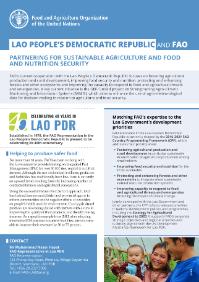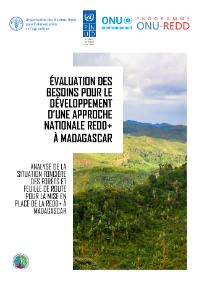Focal point
Location
The Food and Agriculture Organization of the United Nations leads international efforts to defeat hunger. Serving both developed and developing countries, FAO acts as a neutral forum where all nations meet as equals to negotiate agreements and debate policy. FAO is also a source of knowledge and information. We help developing countries and countries in transition modernize and improve agriculture, forestry and fisheries practices and ensure good nutrition for all. Since our founding in 1945, we have focused special attention on developing rural areas, home to 70 percent of the world's poor and hungry people.
Members:
Resources
Displaying 181 - 185 of 5074State of Mediterranean Forests 2018
The Mediterranean region has more than 25 million hectares of Mediterranean forests and about 50 million hectares of other Mediterranean wooded lands. They make crucial contributions to rural development, poverty alleviation, food security, as well as, the agricultural, water, tourism, and energy sectors. Changes in climate, societies, and lifestyles to create appropriate financial incentives and tools.
Lao People’s Democratic Republic and FAO
FAO’s current cooperation with the Lao People’s Democratic Republic focuses on fostering agricultural
production and rural development, improving food security and nutrition, protecting and enhancingforests and other ecosystems and improving the capacity to respond to food and agricultural threatsand emergencies. A key current initiative is the GEF-funded project on Strengthening Agro-climaticMonitoring and Information Systems (SAMIS), which aims to enhance the use of agro-meteorologicalStrengthening Environment, Forest and Climate Change Capacity in Bangladesh - GCP BGD 053
Bangladesh is faced by a number of environmental crises, including an increase in the frequency and severity of extreme climatic events, a scarcity of natural resources and the degradation of the natural environment. Combined with high rates of poverty, these heighten vulnerability to environmental shocks. To address these challenges, effective investment in the environment and forestry sectors is essential.
Guidance on spatial technologies for disaster risk management in aquaculture
This new guide describes the application of spatial technology to improve disaster risk management (DRM) within the aquaculture sector. DRM requires interrelated actions and activities to ensure early warning, prevention, preparedness, response and recovery for a wide range of natural, technological and complex disasters that can impact aquaculture operations and livelihoods.
Évaluation des besoins pour le développement d’une approche nationale REDD+ à Madagascar
En raison des impacts néfastes de l’insécurité foncière sur les ressources forestières, une compréhension approfondie de la situation foncière et l’identification de mesures efficaces pour promouvoir la sécurisation des terres constituent les points de départ d’une gestion durable forestière, notamment dans le cadre des efforts REDD+. Le foncier compte parmi les dimensions incontournables en matière de prévision et de planification des mesures d’aménagement et en matière de répartition des bénéfices des systèmes d’indemnisation ou d’incitation.











